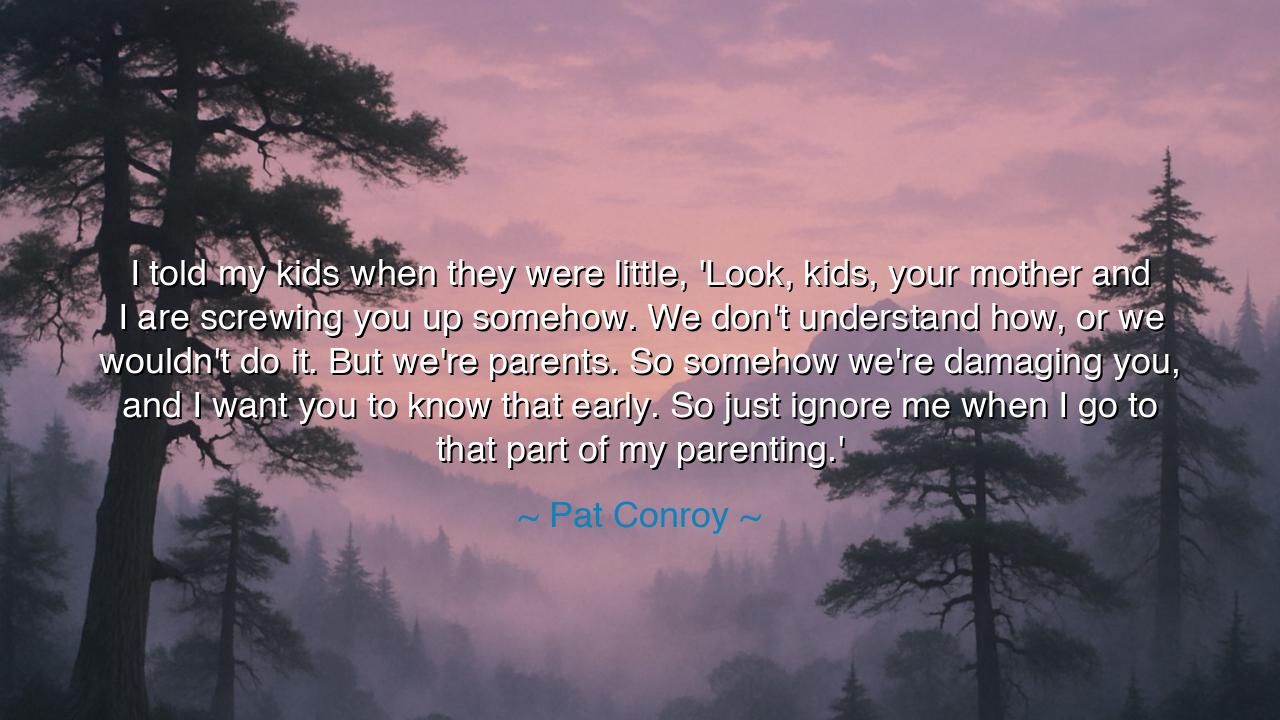
I told my kids when they were little, 'Look, kids, your mother
I told my kids when they were little, 'Look, kids, your mother and I are screwing you up somehow. We don't understand how, or we wouldn't do it. But we're parents. So somehow we're damaging you, and I want you to know that early. So just ignore me when I go to that part of my parenting.'






Hear the voice of Pat Conroy, who clothed truth in both humor and sorrow: “I told my kids when they were little, ‘Look, kids, your mother and I are screwing you up somehow. We don’t understand how, or we wouldn’t do it. But we’re parents. So somehow we’re damaging you, and I want you to know that early. So just ignore me when I go to that part of my parenting.’” These words, spoken with disarming honesty, are not cynicism but wisdom, the confession of a father who knew that love is imperfect and that parenthood, though filled with the best of intentions, always carries the seeds of error.
The origin of these words is the universal truth that parenting is an art with no perfect master. No scroll of the ancients, no modern manual, no whispered counsel of elders can remove the fact that to raise a child is to stumble. A parent, with all their history, wounds, and flaws, cannot help but leave traces of themselves—both light and shadow—upon their children. Conroy’s words, though wry, strike at the eternal paradox: parents strive to protect their children, and yet, through their striving, they may wound them too.
This is no new revelation. The Greeks told of Oedipus, whose fate was sealed not by malice but by the choices and blindness of his parents, who sought to escape prophecy and, in doing so, fulfilled it. The story is tragic, but it holds the same truth Conroy names: parents, even with the best intentions, cannot see all ends, and sometimes their actions wound where they mean to heal. The ancients taught us that imperfection in parenting is inevitable, but what matters most is not perfection, but humility and honesty.
What is striking in Conroy’s words is the honesty offered to his children. Rather than pretend to wisdom he did not have, rather than wrap himself in the armor of parental infallibility, he admitted his flaws. This humility, far from weakening him, gave strength to his children, for it taught them early that authority is not the same as perfection, and that love is not diminished by mistakes. Such an admission may startle, but it offers children a gift: the freedom to question, to forgive, and to grow without the crushing weight of false ideals.
Yet, Conroy does not abdicate his role. He does not say, “Do not listen to me at all.” Instead, he teaches discernment: “Ignore me when I go to that part of my parenting.” It is a father’s way of saying, “Learn to separate the wisdom from the folly, the guidance from the wound.” This is a profound lesson, for life itself requires this same skill. We must all learn to carry forward the good we have inherited, while laying down the burdens that do not serve us. In modeling this, Conroy armed his children with resilience and clarity.
The lesson, then, is not despair but hope: do not seek to be a perfect parent, seek instead to be an honest one. Children are not broken by flaws alone; they are broken when those flaws are hidden, denied, or defended. Honesty and humility create space for forgiveness, for conversation, for growth. To say, “I may wound you,” is to acknowledge responsibility, and in doing so, a parent may reduce the wound itself. For children raised in honesty will know that their parents’ errors were born not of malice, but of the limits of being human.
Therefore, let all who hear these words take this action: do not fear your imperfections, but confess them with love. Teach your children that you are human, and that your mistakes, though real, are not the measure of your love. Apologize when you err, laugh at your stumbles, and remind them that no parent, however devoted, can escape the shadow of imperfection. In this way, your children will grow not with bitterness, but with compassion—for you, for themselves, and for the world.
Thus, Pat Conroy’s words, spoken half in jest, are in truth a profound teaching. They reveal that the noblest parent is not the flawless one, but the one who has the courage to say: “I will fail you in ways I cannot foresee, but I will love you still, and that love, though imperfect, is the most honest thing I can give.” And in this, the child finds not only guidance, but the truest legacy: the wisdom to embrace life’s imperfections with strength and grace.






AAdministratorAdministrator
Welcome, honored guests. Please leave a comment, we will respond soon